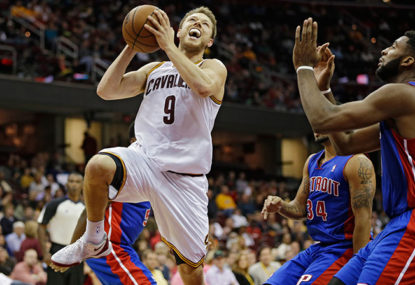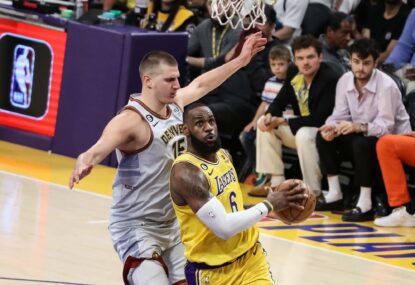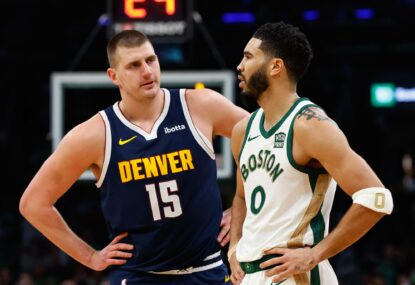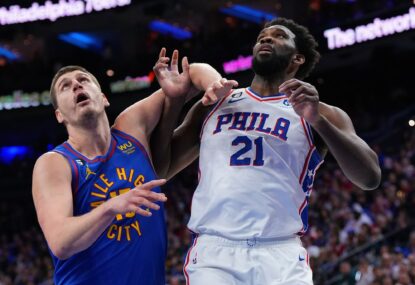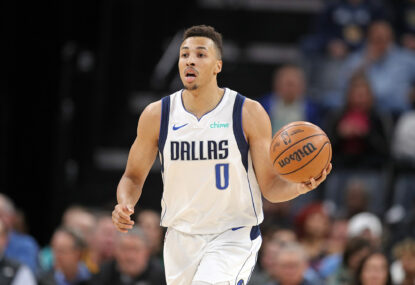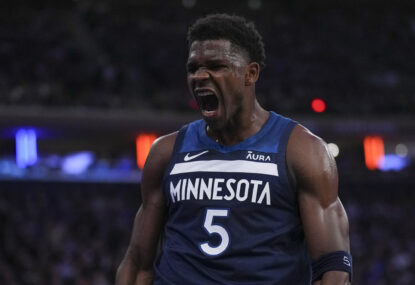A few years back, I was fortunate enough to take to a stage and be congratulated by a middle-aged white man in a suit who shook my hand. It was a scene similar to what I had dreamed of as a kid.
As a 12-year-old, it was a foregone conclusion that I would grow to be 6’6″, be drafted into the NBA and get the golden handshake from NBA Commissioner David Stern.
Only on this day though, as a portly guy only just all of 6’0″, I was shaking the hand of a vice-chancellor from the university I attended.
Instead of receiving one of 30 team caps and adulation from the basketball world, I received a Bachelor’s degree and congratulations from my grandma.
I started consuming the NBA at an earlier age from the other side of the world. I couldn’t work out where Stern fit in with all of it; I was far more interested in three-pointers, alley-oops and sneakers.
Stern was this small, nerdy man in a land of giants who got to shake the hand of rookies and give Michael Jordan his trophies. It wasn’t until later that I came to understand the gravity of the impact that Stern has had on the league and a lifelong obsession.
Stern stepped down as NBA Commissioner this week after 30 years in the position. His accomplishments are well known and have been reported widely.
Owners and (maybe to a lesser extent following the latest bargaining agreement) players are revelling in a league that has never had it so good.
In 1984, the league made $165 million in revenue compared with $5.5 billion in 2013. Player salaries were an average $290,000 with a $3.6 million team salary cap compared to the current average of $5.7 million and a salary cap of over $50 million.
In the past three decades, every franchise has built or renovated their home arena, taking gate revenues to $1.3 billion in 2013 and the league sits on the verge of signing an enhanced TV rights deal that some say will double the current deal that pours $930 million a year into the league.
As Jay Z would say, David Stern is a businessman; the NBA is a business, man.
Yet while these dollar signs are reasons enough to praise Stern, I am not financially invested in the business of the NBA (unfortunately).
As a consumer of the NBA, I am invested in the product the league has to offer and how the NBA, as a vehicle, continues to grow basketball internationally. David Stern was as much at the centre of my interests as he was for the billionaires that own the league.
The bleeding obvious needs to be pointed out. The NBA’s growth during Stern’s tenure has been driven by the likes of Magic Johnson and Larry Bird, Michael Jordan, Shaquille O’Neal and Kobe Bryant, LeBron James and Kevin Durant – extraordinary talents, names that transcend the sport, and with personalities that just happened to be extremely marketable.
Stern never had to wait to hang the hopes of the league on the shoulders of the next superstar. Yet Stern was a driving force in allowing companies to market individual stars, turning humble basketballers into worldwide celebrities.
While team sports are great, superstars sell tickets, jerseys and sneakers. They are the reason why fans all over the world tune into NBA League Pass to watch the league, justifying the enormous TV contracts which Stern negotiated.
The Barcelona Olympics were a watershed moment for basketball as an emerging global game.
With the NBA firmly in the hands of Michael Jordan in his prime, Stern did not stand in the way as the stars of the NBA launched themselves into international competition.
The ‘Dream Team’, the greatest team ever assembled, dominated Olympic competition in Barcelona, laying the foundation for the growth of the game abroad and for the likes of the Yao Ming, Tony Parker, Dirk Nowitski and the Gasol Brothers to become as important to the NBA in recent years as the Dream Team in ’92.
Stern has done more than just facilitate the marketing powerhouse of the league’s stars and the growth of the game internationally. He shrewdly navigated testing times that threatened to upset the profitable, carefully crafted image of the league and its relationship with fans.
Following the ‘Malice at the Palace’ in 2004 – during which the Indian Pacers and Detroit Pistons played out an ugly brawl which took to the stands, culminating with punches thrown between players and fans – Stern acted quickly.
He handed out 140 games of suspensions among the nine players, costing main culprit Ron Artest $5 million dollars in salary.
The following year, Stern sought to rectify a developing image problem throughout the league by installing a dress code for all players during NBA sanctioned events, banning players from wearing oversized jackets, jeans, hats, large jewellery and headphones.
At the time, both measures were criticised – the ‘Malice at the Palace’ repercussions were too harsh, and the dress code argued to be racist.
Fast forward to 2014 and no NBA player has since stormed into the crowd to fight (Artest even changed his name to Metta World Peace) and the dress code has been embraced, with the only fashion-related image problem in the league belonging to Russell Westbrook.
Stern’s greatest achievement is not growing revenue to unprecedented levels for the league’s owners, showcasing the game abroad or continuing to promote and protect a product that fans want to see.
It is the fact that he managed all these achievements concurrently over the course of three decades. The interests of owners, players, and fans, although intertwined, are rarely the same, but all parties will be sad to see the back of Stern.
Stern is no longer the man I knew nothing about when I was young. I know him as the man that is largely responsible for an institution I consume daily.
Like all sports, the NBA belongs to the players, but Stern has done as much off the court as the likes of Magic and Larry, Jordan, and Lebron have done on the court in contributing to the game’s riches and my affection.
As for me, with Stern’s retirement (along with my lack of athletic ability and preference to not play defence), the dream of shaking the Commissioner’s hand and playing in the NBA with all its associated riches are gone.
I ended up putting that Bachelor’s degree to good use and have a comfortable 9 to 5.
At least I get to watch League Pass at my desk. I have David Stern to thank for that.





























































































